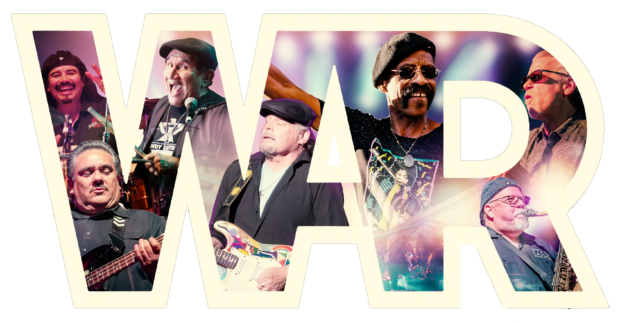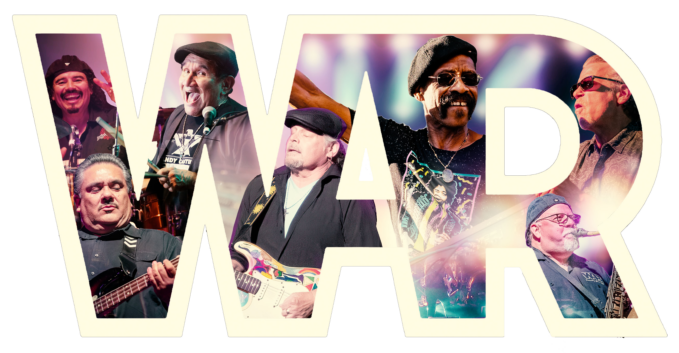The year was 1969…
And these ‘kids’ had the nerve to carry the name WAR at a time when peace was the slogan in an anti-Vietnam America. “Our mission was to spread a message of brotherhood and harmony”. Original Band Members included; Lonnie Jordan/singer/keyboardist, Howard Scott/guitars/ vocal, Lee Oskar/harmonica, B.B. Dickerson/bass vocals, Harold Brown/drums/ vocals, the late Thomas “Papa Dee” Allen/congas/timbales, and Charles Miller /saxophonist/flutist.
“Our instruments and voices became our weapons of choice and the songs our ammunition. We spoke out against racism, hunger, gangs, crimes, and turf wars, as we embraced all people with hope and the spirit of brotherhood. It’s just as apropos today” WAR, the original street band, was brought together by veteran record producer Jerry Goldstein (“My Boyfriend’s Back”, “Hang On Sloopy”, “I Want Candy”) and rock legend Eric Burdon (ex-lead singer of the top British band The Animals). “I first saw some of the guys who would eventually become WAR playing at a topless beer bar in the San Fernando Valley, backing Deacon Jones, the pro football player, and knew immediately how potent these kids were,” states Goldstein. “I was friends with Eric and he was ready to throw in the towel on the music scene and return to Newcastle. He was tired of the ‘rock’ thing and desperate for a fresh authentic sound. I called him the morning after I first saw the band and made him return to the club the next night with me. Eric was so blown away by what he had heard that he jumped on stage to jam with them. The guys weren’t familiar with Eric or The Animals. I had them in the studio within a week, and the rest is history!”
WAR from the beginning was a concept & musical laboratory. As Burdon’s back band, it was the vehicle for Goldstein (as producer/songwriter) and Burdon (as lead singer) to experiment with the blending of many musical styles and influences. “At the time, I didn’t envision WAR as a separate entity. It was just a band to back Eric. I kind of thought it would change with his musical moods” says Goldstein. “It turned out to be that constantly evolving device, just without Eric Burdon.”
Nevertheless, Goldstein’s spontaneous impulse to scratch Burdon’s musical itch would yield a mother lode of chart gold and platinum. WAR would wind-up being honored with 17 gold, platinum or multi-platinum awards which include the triple platinum The World Is A Ghetto, double platinum Why Can’t We Be Friends? and Greatest Hits, platinum Deliver The Word, WAR Live, All Day Music, Best Of WAR and…more and Platinum Jazz, and gold Eric Burdon Declares WAR, Galaxy, and The Music Band.
Eric Burdon and WAR began playing live shows and immediately found themselves in front of sold-out audiences throughout Southern California before entering into the studio to record their debut album Eric Burdon Declares WAR. The album’s key track, the erotic Latin flavored “Spill The Wine” was an immediate worldwide hit and launched the band’s career.
Burdon and WAR toured extensively across Europe and the States, garnering rave reviews from mainstream and music press alike. England’s New Music Express called WAR “the best live band I ever saw” after their first UK gig in London’s Hyde Park. Musicians on both sides of the ocean were buzzing about this new band. Jimi Hendrix jammed with WAR at Ronnie Scott’s Club the night on which Hendrix died. The Black Man’s Burdon, a 2nd Burden & WAR album was released in 1970. Exhausted and volatile, Burdon bailed out on WAR in the middle of a European tour. Already starting to assert themselves, WAR finished the tour without him and returned to record an album without Burdon. When Eric Burdon and WAR’s success outlasted the mercurial Burdon’s attention span, Goldstein was faced with trying to make WAR stand on its own. The result was WAR’s 1971 self-entitled debut album. While this album met with only modest success, it laid the groundwork for things to come. “They loved playing live and toured constantly. The experience of making the first album was enlightening to all of us, especially me. I really felt I got an understanding how to make this work and rushed them back into the studio to cut the second album” says Goldstein.
In late 1971 WAR released All Day Music, the title track would be the group’s first hit single, and their first gold single “Slippin’ Into Darkness” followed propelling the album to over 1 million sales and a winning streak that would continue for years. In 1972 the band’s sound was refined and deepened with the release of The World Is A Ghetto; a celebratory, reflective, and gritty album which was recorded in just 29 days with Goldstein and legendary British recording engineer Chris Huston behind the recording console. Its first single, “The Cisco Kid” shipped gold and brought the band a following in the Hispanic community that has remained loyal to the group to this day. The thought provoking title song “The World Is A Ghetto” fueled the album to the Number One chart spot in Billboard and was voted Billboard’s Album of the Year.
The next album, Deliver The Word (1973), contained the hits “Gypsy Man”, “Me And My Baby Brother”, and a re-recording of “All Day Music”. This album proved a real challenge for the band since the pressure of their previous hits and too much focus on enjoying the fruits of their success made concentration difficult. Despite these conditions, the album went on to sell nearly two million copies. It was 1975 when the Why Can’t We Be Friends? album was released. It contained the hit title track, “Low Rider”, and “Don’t Let No One Get You Down”. This year saw WAR’s touring, record sales, and notoriety reach new heights. They performed at the first Congressional Black Caucus and witnessed their hit “Friends…” played as a soundtrack to the first U.S.-Soviet space mission in which Astronauts and Cosmonauts linked up in the spirit of friendship. “Friends…” stayed on the U.S. charts for thirty-one weeks and earned the band yet another platinum-plus album. Exhausted from a non-stop schedule, the band took a year long hiatus from recording, but did release a Greatest Hits LP, which contained one new song, “Summer”. War became the first group to ever include a new cut on a Greatest Hits package. With its easy flowing style the single went gold.
Another compilation followed in 1977 with the release of Platinum Jazz, which gathered WAR’s extended jams and instrumental pieces and was released on the Blue Note jazz label. It became Blue Note’s first Platinum album. 1977 found WAR the funky band in a “funky” place. Disco, with its programmed beats, slick production and shallow lyrics, was dominating the music scene and the un-constructed and free form street music that defined WAR was clearly not in vogue. Still, the group managed to attain success with the album Galaxy and its sleek, dance-grooved, spacey lyric title single. “Galaxy was inspired by Star Wars and just fit into vibe of the time.” Goldstein remembers. While Galaxy inspired by a film, ironically WAR’s next project would be a soundtrack album for the movie “Youngblood.” in 1978. The story of a Los Angeles street kid starring Lawrence Hilton-Jacobs, of the popular 70s television series Welcome Back Kotter, would be a flop and the WAR soundtrack would fly under the radar. Although, WAR would never rekindle the level of prosperity that was reached in the mid-seventies, it continued to record releasing the albums: The Music Band (1979), The Music Band 2 (1980), and Outlaw (1982). The singles “Outlaw”, “You Got The Power”, and “Cinco De Mayo” were warmly embraced by WAR fans. In 1979, B.B. Dickerson departed during recording sessions for WAR’s next album. Replaced by Luther Rabb, base guitarist who helped WAR complete the album, WAR considered a name change that didn’t happen. WAR made a series of albums titled ‘The Music Band’. The series consisted of two studio albums (The Music Band, The Music Band 2, both in 1979) and a live album (The Music Band Live, 1980). WAR left MCA in 1981 and had already made records for other labels, MCA expanded the series with a compilation (The Best of the Music Band, 1982) and a third original album of left-over material (The Music Band – Jazz, 1983). WAR lost Charles Miller in 1980 (saxophone) whom was murdered. Miller however had already been replaced by Pat Rizzo (ex Sly and the Family Stone) in 1979. Quite familiar with change, WAR was evolving as new band members joined up with the likes of; Alice Tweed Smith (credited as “Tweed Smith” and “Alice Tweed Smyth” on various albums) on percussion and vocals (giving the band its first female vocalist), and Ronnie Hammon as a third drummer.
In 1981 after WAR made the one-off single “Cinco de Mayo” for LA Records (Jerry Goldstein’s own label, which also reissued Eric Burdon Declares “War” under the title Spill the Wine the same year), War signed with RCA Victor Records and recorded singles “Just Because”, “Outlaw” (1982) and “You Got the Power”. Followed by “Life” (is So Strange) (1983). WAR did not record another full album until a decade later. The “Best of WAR” compiled in 1987 included two new tracks, “Livin in the Red’, and “Whose Cadillac is That?”, and a remixed version of “Low Rider” in addition of to the original “Low Rider” version. Papa Dee Allen died of a heart attack that struck him on stage in 1988.
The band’s popularity has grown steadily ever since, as a result of the commitment to being road WARriors combined with great increases television appearances, record sales, use of their music in film, television and commercials, samples and covers by other recording artists. A big shot in the arm to WAR’s presence on the touring scene was the release of 1994’s Peace Sign, an album well received by critics and fans. WAR now tours over 150 dates a year to audiences ranging from tens of thousands to intimate clubs.

